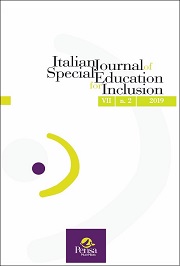La visione del bambino in Maria Montessori: tra pedagogia speciale, psicologia dello sviluppo e didattica generale
DOI:
https://doi.org/10.7346/sipes-02-2019-04Resumen
This contribution aims to highlight the aspects of the Montessori Method that are particularly functional to inclusive classroom management and for a heterogeneous school context. The theoretical framework is the idea of education in the Montessori approach in that she is considered the forerunner of an inclusive pedagogical vision. In fact, while the first years of her research were addressed to the field of special education, she was soon convinced of the possibility of extending her studies also to “conventional” schools. On the basis of this belief, her experimental work was soon extended from institutions for disabled children to a series of kindergartens (called “Children’s House”) first in Rome and then in the rest of the world. In the second part of this brief analysis, a study is presented on the use of the QBS questionnaire (Tobia & Marzocchi, 2015) with a sample of 73 Montessori public school children and their parents. The questionnaire on “Quality of Wellbeing at School” is the tool we selected for the phase of data collection, with the intention to investigate the point of view of pupils and their parents. Our analysis aims to understand the perception of well-being at school in children and their families. The statistical analysis applied to the results from the administration of the questionnaires revealed some significant data, in particular in the scale relating to satisfaction and recognition and in the scale relating to the relationship with classmates. At the same time, the statistical analysis of the questionnaire dedicated to parents revealed a significant effect on the scale related to child awareness.


